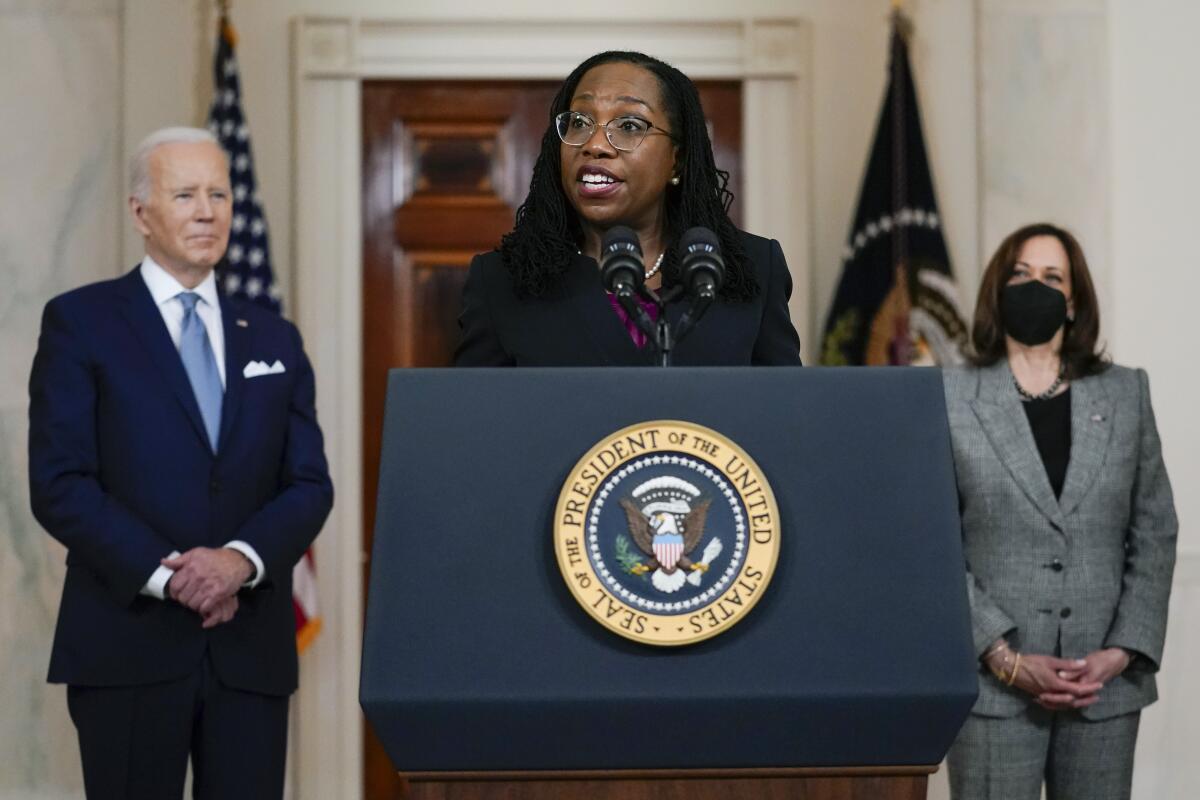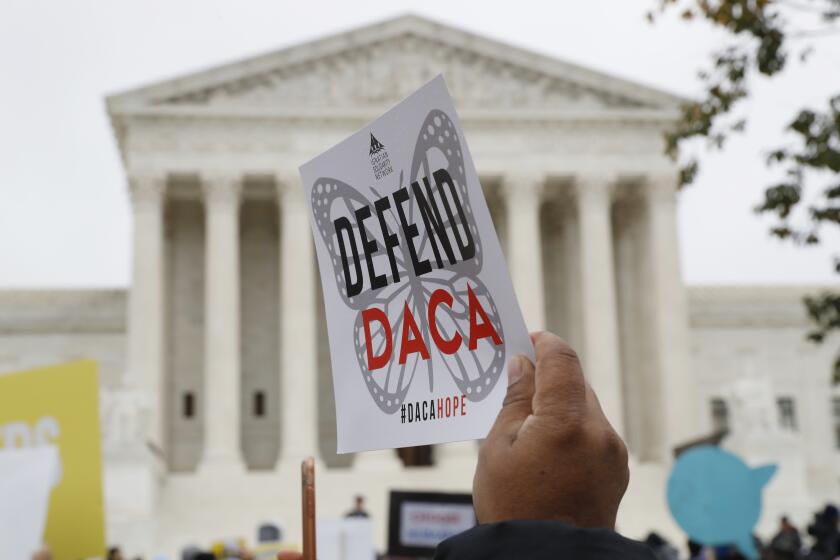Opinion: Ketanji Brown Jackson an impressive and historic pick for the Supreme Court

The editorial board operates independently from the U-T newsroom but holds itself to similar ethical standards. We base our editorials and endorsements on reporting, interviews and rigorous debate, and strive for accuracy, fairness and civility in our section. Disagree? Let us know.
The San Diego Union-Tribune Editorial Board has long believed that elections have consequences, and that presidents should be shown deference on their Supreme Court nominees — so long as they have impressive credentials, a firm grasp of the law and powerful testimonials from their peers.
That hasn’t always happened. In 1970, President Richard Nixon nominated federal appeals court Judge G. Harrold Carswell to the high court. Considered an unimpressive hack by Republicans and Democrats alike, Carswell won support from Sen. Roman Hruska, R-Oklahoma, who said, “Even if he were mediocre, there are a lot of mediocre judges and people and lawyers. They are entitled to a little representation.” His nomination was rejected.
Thankfully, the typical nominee has met high standards. This is certainly true for President Joe Biden’s first nominee, D.C. Circuit Court Judge Ketanji Brown Jackson, 51. Much of the preliminary focus was on how she would be the first Black woman on the court. This, of course, has tremendous cultural and historical significance — and is “long overdue,” as Biden said last month. It remains shocking that the court has only ever had two Black justices and didn’t have a single woman until 1981.
But such framing, while important for our nation’s history and the hopes of underrepresented people everywhere, should eventually give way to an appreciation of Jackson’s impressive qualifications and obvious strengths. On a court fairly criticized for the homogeneous backgrounds of sitting members, she would be the first justice with an extensive background as a criminal defense attorney since Thurgood Marshall retired in 1991. She worked at the federal public defender’s office in Washington, D.C., for more than two years, and it sets her apart.
“The law is not some esoteric thing to Joe Biden,” Jeff Peck, staff director of the Senate Judiciary Committee when Biden was its chair, said. “He wants to make sure there’s a justice who understands how the law impacts people in their day to day lives.”
Jackson’s law degree is from Harvard, where she won academic honors and was supervising editor for the Harvard Law Review. She worked as a clerk for Justice Stephen Breyer, whom she would replace if confirmed, and was recalled by Breyer and many others whose paths she crossed as brilliant, kind and collegial. In her nine years as a federal district and appellate judge, Jackson won praise for her clear-eyed view that elected leaders needed to follow accepted norms. This made it inevitable that she would have run-ins with the Trump administration. “Presidents are not kings,” she wrote in 2019, issuing a ruling that former White House counsel Donald F. McGahn II had to obey a congressional subpoena. “They do not have subjects, bound by loyalty or blood, whose destiny they are entitled to control.”
This will no doubt be held against her by many Senate Republicans. They have already made clear that Jackson’s nomination will be subject to the same partisan politicking that has seen the last five nominees each get at least 31 no votes. The thorough vetting that Senate GOP Leader Mitch McConnell promises will soon be revealed as a series of manufactured pseudo-outrages.
It didn’t used to be this way. Three of President Ronald Reagan’s nominees were approved unanimously, and Bill Clinton’s two nominees were approved 96-3 and 87-9. It shouldn’t be this way now. In a nation with healthier politics, Jackson’s selection would be seen as something to celebrate. If confirmed, she said Friday, “I can only hope my life and career, my love of this country and the Constitution, and my commitment to upholding the rule of law and the sacred principles upon which this great nation was founded, will inspire future generations.”
Vetting Jackson may raise issues. But the substance of Republican critiques of her so far has been that she’s not a Republican. Justice Amy Coney Barrett was confirmed 30 days after her nomination in 2020. Our hope now is that lawmakers question Jackson respectfully, then let her get to work.
Get Essential San Diego, weekday mornings
Get top headlines from the Union-Tribune in your inbox weekday mornings, including top news, local, sports, business, entertainment and opinion.
You may occasionally receive promotional content from the San Diego Union-Tribune.







